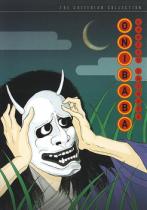Onibaba
 Year:
Year: 1964
Film Studio: Toho, Tokyo Eiga, Kindai Eiga Kyokai
Genre: Drama, Horror
Length: 103 Min.
Director Kaneto Shindô (1912)
Writer Kaneto Shindô (1912)...Written By
Producer Hisao Itoya
Kazuo Kuwahara
Tamotsu Minato
Setsuo Noto
Cinematographer Kiyomi Kuroda
Music Hikaru Hayashi...Composer
StarsNobuko Otowa (1925) as Kichi's Mother
Jitsuko Yoshimura (1943) as Kichi's Wife
Kei Satô (1928) as Hachi
Jûkichi Uno (1914) as Samurai General
Taiji Tonoyama (1915) as Ushi
Senshô Matsumoto as Runaway Warrior A
Kentaro Kaji as Runaway Warrior B
Hosui Araya as Ushi's Follower
Review With the Criterion Collections release of Kaneto Shindo’s
Onibaba on DVD, hopefully a new generation of movie fans will begin to embrace this forgotten gem of the mid-sixties. From the claustrophobic hut that the women live in, to the windswept open fields that the daughter must cross to meet her new lover, Shindo paints a canvas of rich symbolism to convey his story. One part Japanese horror to two parts erotic fantasy make for a unique combination of storytelling that in the hands of a director less talented, could become campy or downright boring.
Two women, a mother (Nobuko Otowa) and a daughter-in-law (Jitsuko Yoshimura), eke out a meager existence by murdering lone samurai and dumping their bodies in a deep cavernous hole in the middle of the swamp that they live in. By trading the warrior’s armor for food, they subsist day-to-day in this dangerous and dreary world. The supply of disgruntled ronin who are weary of war without end, seems endless, and for the time being the two women survive. They long for the day when the fighting ends and the man who can free them from this Spartan way of life, returns. The son, who is married to the young woman, has been gone for a long time with no word of his fate reaching his relatives. One day a friend who had left with the son, appears at the women’s hut with news that will upset the fragile balance between the two women. His name is Hachi (Kei Sato), and he recounts for the women how he and the son were attacked by farmers, and that the son was killed.
As time passes, the primal carnal urges begin to re-awaken in the young girl and she clandestinely crosses the swamp at night to meet Hachi in his hut. The old woman fears that Hachi will take the young girl away from her, leaving her with no ability to survive. One night when the girl is away, a samurai wearing a demon mask comes to the door of the hut just as the old woman is about to go off and find the girl. She leads him through the swamp grass towards the cavern, where he falls in and dies. She pries the mask off the dead man and hatches a plan to end Hachi’s and the young girls nocturnal forays. The old woman knows that the young girl is terrified of demons as she runs the gauntlet of swamp grass to Hachi’s hut. The next night the old woman sets off with a load of armor to barter and bids the young girl goodbye. Thinking that she is free to meet Hachi, the young girl races across the swamp to meet her new lover. Halfway between the two huts, a demon spirit rises from the tall reeds and blocks the young girls path. She screams in terror and flees back to her hut. The old woman will continue this deception until a thunderstorm one night causes the mask to impart its own demonic torture on its bearer.
Though the film is relatively sparse in dialogue, it makes up for it with some of the most beautiful black & white cinematography ever put on celluloid. Shindo must have been a great admirer of the silent films of his youth, for he tends to make films that are driven by strong visual imagery, rather than rely on wordplay to move the story along. It's really a shame that the original opening sequence is not viewable on this DVD. This scene depicts a wandering samurai being decapitated, and supposedly caused a viewer to have a heart attack after seeing it, and thus was edited out of the final release. This is definitely not a movie for everyone, but if your looking for a diversion from the contemporary horror film, then give this film a chance, you’ll be pleasantly surprised. It’s worth the time just to gaze upon Jitsuko Yoshimura, who was one of the prettiest Japanese actresses of the sixties.
Ratings Criterion5 Stars - The pinnacle of film perfection and excellence.
4 ½ Stars - Not quite an immortal film, yet a masterpiece in its own right.
4 Stars - Historically important film, considered a classic.3 ½ Stars - An entertaining film that’s fun or engaging to watch.
3 Stars – A good film that’s worth a Netflix venture.
2 ½ Stars - Borderline viewable.
2 Stars – A bad film that may have a moment of interest.
1 ½ Stars – Insipid, trite and sophomoric, and that's its good points.
1 Star – A film so vacuous, it will suck 2 hours from the remainder of your life.
½ Star - A gangrenous and festering pustule in the chronicles of celluloid.